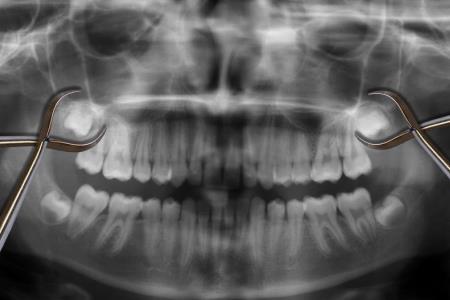Payment plans might relieve some of your pain if you do not have enough money to remove your wisdom teeth.
Dental payment plans allow you to spread the cost of your wisdom teeth removal over time rather than bunching them upfront, making it easier to manage your budget.
Payment plans and financing are synonyms, so do not allow the interchangeable terms to set you on the wrong course. Borrow as little money as possible!
Invest in dental insurance with no waiting period to make the procedure more affordable, and do not overlook billing your healthcare plan for medically necessary bone-impacted extractions.
Wisdom Tooth Removal Financing
Financing is the primary engine driving payment plans for wisdom teeth extraction. In most cases, a third party provides the funding to the oral surgeon or dentist and bills the patient in equal monthly installments afterward.
(Sponsored Link)
Bad Credit
Patients with bad credit history probably should not rely on oral surgeons offering payment plans. The one third-party finance company might reject your application, leaving you unable to pay for wisdom teeth extraction.
Arrange the financing in advance when you have more options instead of waiting until the last second.
Dental loans for bad credit borrowers are all about network size. Your approval odds are poor when your consumer report is riddled with derogatory marks and FICO® or Vantage® scores are low. Therefore, many lenders (not just one) need to review your credentials to improve your chances.
No Credit Check
Patients with no borrowing history probably should not rely on oral surgeons offering payment plans for wisdom teeth extraction either. The one third-party finance company is unlikely to approve applicants without a credit check through Experian, Equifax, or TransUnion.
No credit check dental financing is available through a Flexible Spending Account (FSA). Contribute during the annual open enrollment, and schedule the removal of your third molars at the beginning of the plan year.
Your employer cannot pull a copy of your consumer report and must reimburse qualifying expenses immediately. You have up to fifty-two weeks to repay your employer with pre-tax dollars, which saves money on your taxes!
Offices Offering
Searching for oral surgeons offering payment plans is a popular way to finance wisdom tooth removal, but it may not be the most effective approach. Would you stop into your local bank branch and ask them to extract one of your third molars?
Of course, that would be silly. The bank would refer you to a local dentist or oral surgeon for the work but might offer you a loan to help you pay for treatment.
Likewise, most oral surgeons refer patients to third-party finance companies specializing in credit underwriting, billing, collections, and reporting to consumer agencies (Experian, Equifax, and TransUnion).
Doesn’t it make more sense to arrange financing before selecting an oral surgeon?
Dental Insurance Payment Plans
Do not forget about dental insurance premiums to cover wisdom teeth removal. They belong in the payment plan equation. You might be able to lower the amount financed for gum-impacted extractions by buying a new plan.
When you borrow less money, you pay less interest and origination fees, and the monthly installment is more affordable.
Monthly Premium
Dental insurance monthly premiums add to your payment plan costs initially. Still, they can reduce the interest charges that accrue over time by lowering the amount needed to finance wisdom teeth extraction.
Dental insurance with no waiting period for wisdom tooth extractions will cost more than it returns in benefits during the first year. The issuing company includes other limitations that guarantee that premiums exceed claims payments.
If the monthly premiums exceed the benefits, why buy a plan? Your savings come from an unexpected source, which you can read about next.
Financing Savings
PPO dental insurance can make payment plans for wisdom teeth removal more affordable by lowering the amount financed. This phenomenon holds even though the monthly premiums might exceed the limited benefits.
In-network oral surgeons cannot charge more than insurance allows in their contract with the PPO (Preferred Provider Organization). The authorized amount is a pre-negotiated discount, often 30% to 40% lower than the retail price charged to other patients.
You can reduce the amount financed and associated interest charges and origination fees further when the plan pays a small percentage of the allowed amount. For example, your experience might reflect these average figures.
- Retail price: $1,900
- Allowed amount: $1,300
- 25% benefit: $325
- Amount financed: $975
Medical Insurance Payment Plans
Medical insurance-funded payment plans are the most affordable because the oral surgeon balance bills a tiny fraction of the costs for a bone-impacted wisdom tooth removal.
The amount financed is often the smallest when the procedure is medically necessary.
Private Plans
Dental payment plans for wisdom teeth extraction are more affordable when your private health insurance funds most of the bill. In these cases, you might have to finance only the annual deductible.
Health insurance covers wisdom tooth extraction when medically necessary: care arising from non-biting accidents, certain diseases, and treatments considered integral to other services included in the plan.
The extraction of bone-impacted third molars typically falls into the medically necessary category because they can cause pain and infection and develop cysts, triggering coverage for multiple services.
- Surgery to extract the teeth
- Therapeutic drug injection (Dexamethasone)
- Deep sedation (general anesthesia)
- Panoramic radiographic image
Public Plans
Low-income patients qualifying for Medicaid often enjoy the most affordable payment plans for wisdom teeth extraction because this public program has a dual nature. The amount financed could be negligible depending on the rules in your state.
- Medicaid covers wisdom teeth extraction for adults and children when bone-impacted nationwide. In these instances, the public program operates as health insurance, honoring claims for medically necessary oral surgeries.
- In each state, Medicaid covers oral surgery for adults differently when the operative procedure is not medically necessary. For instance, thirty-one states might support benefits for extracting gum-impacted third molars, while the others pay nothing.






